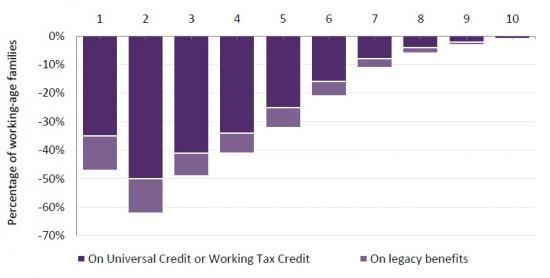Joseph Rowntree Foundation - Spring Budget 2021 Analysis - What Does The Chancellor's Budget Mean For Poverty In The UK?
5th March 2021

When he delivered his Budget the Chancellor promised to ‘Continue
doing whatever it takes to support the British people and businesses
through this moment of crisis'. But ultimately, more people will be
swept into poverty in the face of continued economic uncertainty
and inadequate support.
Before the Budget we set out five tests to judge whether the
measures announced would deliver for people living poverty. Our
analysis shows that the choices made by the Chancellor on social
security, housing, and the economy do not pass those tests and risk
pulling people into poverty as a result.
What does the Chancellor's Budget mean for poverty
in the UK?
The Chancellor pledged to ‘meet the moment' and do ‘whatever it takes to support the British people', but in our assessment he failed his own tests, and ultimately more people will be swept into poverty as a result. The last year has shown us that people want to look out for and care for each other, and these should have been the values
underpinning the Budget.
This Budget should have been the moment where the Chancellor seized the opportunity for change, and avoided a return to the pre-pandemic normal. We came into the pandemic in bad shape following a decade of deprivation where living standards fell, and fell fastest for those at the bottom. The pre-pandemic normal is one
where people were pulled into poverty by crippling housing costs, jobs that lacked security, dignity and decent pay, and a social security system that did not do enough to keep people afloat. The pandemic then hit those with the least the hardest.
The health restrictions may be beginning to ease, but the economic storm caused by the pandemic is still raging. The Chancellor extended some schemes for six months, including furlough, further rounds of the self-employment support scheme and the extension of the uplift to Universal Credit and Working Tax Credit. After that he is
gambling with the recovery, hoping the best-case scenario will play out, and taking little positive action to drive a good recovery. If that gamble does not pay off those with the least will pay a high price.
We needed a Budget that provided families with stable support that enables them to build a decent life. Instead, the £20 uplift to Universal Credit and Working Tax Credit, that has been a lifeline to so many, is being whipped away at the end of September, leaving 6 million families over £1,000 per year worse off overnight. This will cut the adequacy of our social security support just as furlough is ending and unemployment peaks at 2.2 million, creating a perfect storm for those on the lowest incomes as we head into the winter.
We needed a Budget that headed off a wave of evictions brought about by a decade of insufficient help with housing costs, compounded by the effects of the pandemic. It was also an opportunity to create jobs and make housing truly affordable with an
ambitious plan to build more social housing. Instead, billions were committed to measures that will further inflate house prices and help relatively wealthy people buy expensive houses, while there was nothing for the 700,000 renters in arrears who risk losing their homes entirely, or for the millions trapped in poor quality homes,
struggling to keep up with unaffordable rents.
We needed a Budget that took an active approach to the recovery, stimulating the creation of new jobs in ways that would also address problems that pull people into poverty - for example by investing in energy efficiency measures to tackle fuel poverty or by building social housing to lower housing costs, and expanding the number of jobs in social care while improving their quality and pay. Instead, the Chancellor has gambled on a recovery driven almost entirely by people spending the money they have saved over the last year. He hasn’t lined up significant fiscal stimulus to kick in as furlough ends, to ensure a strong recovery and spread it to all parts of the country.
This is a high-stakes bet and the OBR has made clear there is a lot of uncertainty around their forecasts. Those with the least have the most to lose if the gamble doesn’t pay off and unemployment rises further. It also risks an uneven recovery, with worse-off places recovering more slowly, acting against the goal of levelling up - an
effect that won’t be countered by the piecemeal and short-term funding announced for levelling up.
One brighter spot was the extension and phasing out of furlough and the support announced over the last year for people to get back into work, although there remain gaps in the retraining offer. However, these policies will be of less consequence if the
underpowering of the stimulus means the jobs aren’t there for people to move into.
We needed to see bold policy that ensures a strong recovery to match the compassionate moves taken to protect people’s incomes at the start of the pandemic. The Chancellor should have made the choice to build a different future. One that is characterised by good jobs and investment in people and their skills, where housing is
genuinely affordable and where social security is there for us when we need it. This Budget fell far short of what the country requires and of the values we share.
[b]Download the 29 page report HERE[b]
JRF web site
